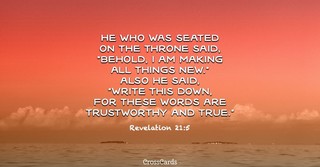
- Recent Translations
- All Translations
Revelation 21:14
Share
Settings
Images for Revelation 21:14

Revelation 21:14 Meaning and Commentary
And the wall of the city had twelve foundations
Christ is the one and only foundation of his church and people, of the covenant of grace, and of salvation; and of faith, hope, peace, and joy, and of eternal happiness, and so of this glorious state of the church; he will be the light and temple of it, the glory and safety of it; he will be all in all in it; but because he has been ministerially laid as the foundation, by the twelve apostles, for men to build their present and future happiness upon, therefore the foundations of the wall of salvation are said to be twelve; see ( Ephesians 2:20 ) . Moreover, this may denote the firm and immovable state of the church at this time, it being a city which has foundations, or is well founded, ( Hebrews 11:10 ) with which compare ( Isaiah 14:32 ) ( 28:16 ) . Hence it follows,
and in them the names of the twelve apostles of the Lamb.
The Alexandrian copy, Vulgate Latin, Syriac and Arabic versions, read, "the twelve names of the twelve apostles"; the allusion seems to be to the inscribing of the names of builders on stones laid in the foundation, in memory of them; and so these wise master builders will be had in everlasting remembrance.